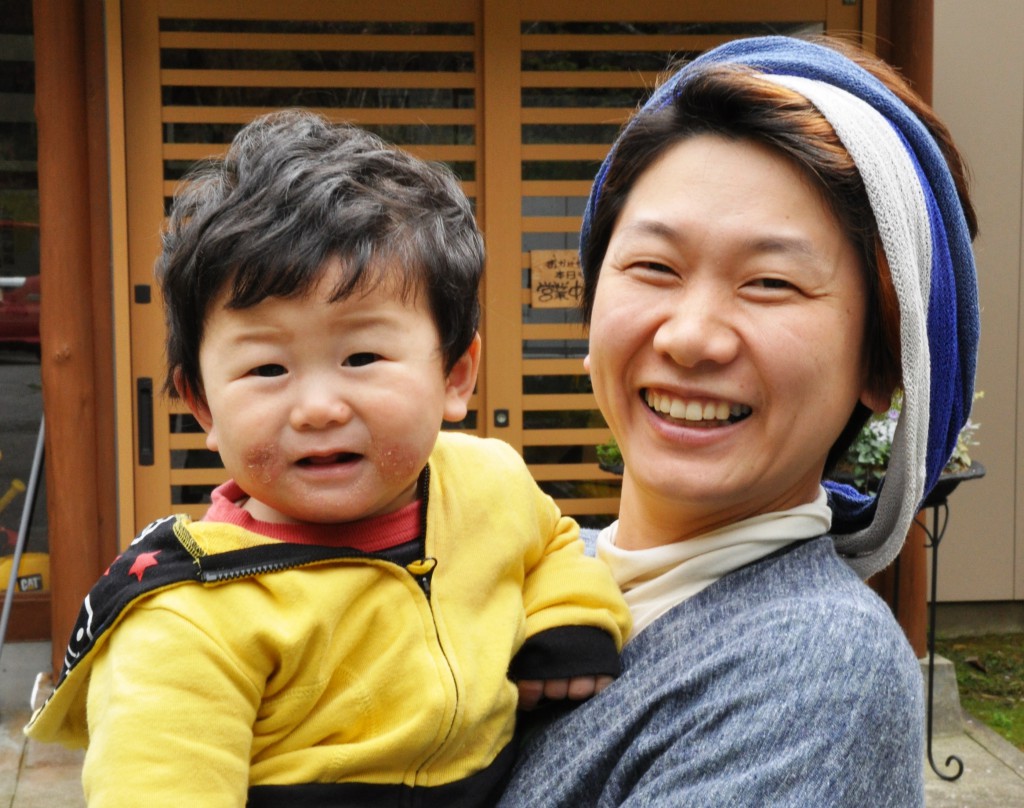
Keiko Komatsu (Aki-shi, Kochi Prefecture) : Born in 1983 in Uwajima-shi, Aichi Prefecture into a family in the fish breeding business and grew up with neighbors who grow potatoes and citrus fruits in their terraced fields. In 2010, got married and moved to Hatayama, Aki-shi, Kochi Prefecture. She now helps her husband’s chicken farm and runs a guest house which also severs as a restaurant, as a registered inn owner of Aki-shi.
Keiko Komatsu
Food is an essential part of our life. However, environment surrounding food producing communities are not that easy. Many children born in the farming, mountain and fishing villages must leave their home towns as soon as they graduate. I myself left home in a fishing village in Ehime Prefecture to get a job at a company in urban area of the prefecture. Then I gradually came to think that I don’t want to lose my previous life style in which I could get hold of my own food in my backyard and that I want to share this feeling with others.My husband was also struggling in one of the marginal villages in Kochi Prefecture, which is Hatayama in Aki-shi. In the past fifty years, population of Hatayama shrunk from 800 to less than 50 because many left the village to find a job. Hatayama has no public water supply system. It’s not in a cell phone service area. Its only one Prefectural road sometimes gets blocked.
My husband was in his 50s when we got married. He was 25 years older than I, but I asked him to marry me as I thought only he could share the same feeling about food with me. In five years, we were blessed with two sons.
Hatayama has lots of disadvantages, but if you see it differently, it’s a beautiful village that offers you a dream life. The village with such a long history should have strength to support our living. “Any traditional business and festival has a founder,” my husband says, and he thinks he also wants to be a founder of something that will support people’s future life in Hatayama.
Consumers’ needs are so varied and transporting goods and products are so much easier now. This should make our life in Hatayama easier, too. The keys are, I think, combining delicious unique food and ingredients with unique local stories and developing direct communications with those who eat them. The pillar of our business and communication is “Tosa Jiro.
Tosa Jiro is a chicken bred locally by Kochi Prefecture for producing eggs. My husband did something that no one else has done before. He started a Tosa Jiro chicken farm to supply Tosa Jiro for meat. He fell in love with the deep flavor of it. It takes almost 150 days to raise a Tosa Jiro that weights around 1.5 kilograms. We sell approximately 10,000 chickens a year. The chicken farm, the poultry processing plant, the meat shop, and the restaurants that sell Tosa Jiro dishes are all located in Hatayama. The Tosa Jiro meat business has grown and this company now has five employees in addition to family members. We have a few thousand visitors a year.
There are many challenges in running a business in a marginal village, but we still believe in our future. Our company is named Hatayama-Mura. I want it to serve as a mura (village) for our children to keep living. I also want to pass down to the children the happiness of finding a job that has something to do with creating food.
(May 28, 2015)

